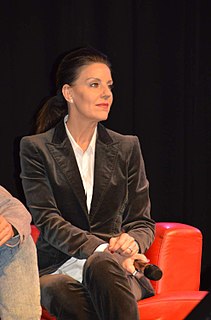A Quote by Andrea Parker
I have not looked at any of the 'Pretender' Web sites. I'm scared of the Internet.
Related Quotes
Everyone should be concerned about Internet anarchy in which anybody can pretend to be anybody else, unless something is done to stop it. If hoaxes like this go unchecked, who can believe anything they see on the Internet? What good would the Internet be then? If the people who control Internet web sites do not do anything, is that not an open invitation for government to step in? And does anybody want politicians to control what can go on the Internet?
When I was 14, I spent a huge amount of time on the Internet, but not the Internet we know today. It was 1994, so while the World Wide Web existed, it wasn't generally accessible. Prodigy and CompuServe were popular, and AOL was on the rise, but I didn't have access to the web, and no one I knew had access to the web.
The open web is full of spam, shady operators, and blatant falsehoods. Outside of a relatively small percentage of high quality sites, most of the web is chock full of popup ads and other interruptive come-ons. It's nearly impossible to find signal in that noise, and the web is in danger of being overrun by all that crap.




































